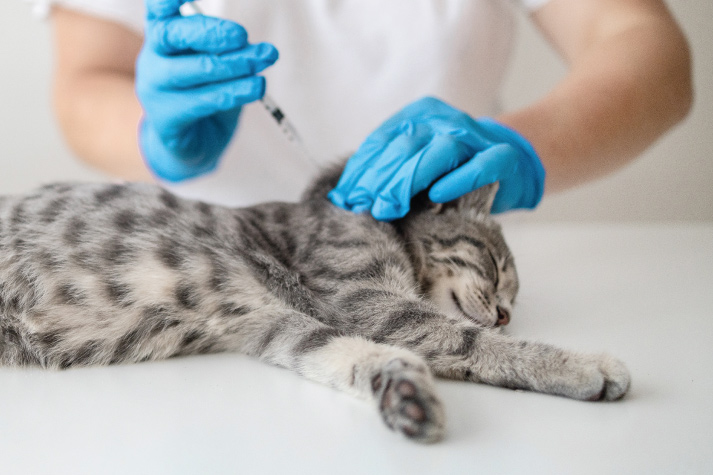


12 Dec
Vaccinations are a relatively simple and efficient method of preventing potentially harmful and even fatal diseases. This protection isn’t limited to humans either; our pets require vaccinations just like us to protect them from a variety of conditions. Without them, your pet runs the risk of being exposed to diseases that could be fatal.
Vaccinations aren’t just handy for preventing diseases either. If you're a frequent traveller or if you ever plan on travelling with your pet, you should know that a fair number of countries require your pet to be vaccinated before they are allowed to enter. To simplify the process for you we've compiled this handy guide to help you understand your pet’s vaccination requirements. Here’s everything you need to know.
While they can be scary for both humans and pets, vaccines are used to protect us from 6infectious diseases by preparing our immune systems to fight against them. If your pet is vaccinated against a disease, their immune system will be primed to ward off the disease thanks to the prior vaccination.
Immunizations prepare the immune system through the development of certain antibodies, which then fight off an infection in case your pet catches it. Simply put, timely pet vaccinations are important for your pet’s health and to make sure they do not fall sick. Vaccinations also reduce the severity of some diseases which would otherwise be fatal to a pet.
But that’s not all; pet vaccines are as important for your health and well-being as your pet’s. Some diseases carried by pets are zoonotic, meaning they can spread from animals to humans, and since pets are near us for most of their lives, it is important to protect both yourself and your pet through vaccination. An example is the rabies virus, which is fatal for humans once the symptoms appear, and is one of the primary vaccines a pet should have, especially if you’re planning international pet travel.
Pet vaccines help prevent diseases for both you and your pet, which is a big plus point to start with. This benefit is heightened when you consider that some zoonotic diseases have no cure once someone is infected, and vaccinations prevent or significantly reduce the chances of any harm befalling your pet.
Vaccinations also help prevent unwanted expenses; as pet parents, we wouldn’t hesitate for a moment to provide the best treatment for our pets when they fall ill. However, since prevention is better and more cost-effective than cure, pet vaccines are a much better safety net when the alternative is waiting for your pet to fall ill and try to cure their ailment. Theoretically, pet vaccines also help reduce the rates of a disease or even eradicate it, but that depends on all pet owners being up-to-date with their pet’s vaccinations. As an example, it Is easier to vaccinate your pet against rabies than it is to book and pay for a rabies titer test.
Core and non-core vaccinations are terms you may have heard of as a pet parent. Vaccination types and schedules are tailored to diseases that may be more prevalent in a country since no two countries have the same conditions and biodiversity. Such vaccinations are known as core vaccines for pets, and these are important for your pet's health and well-being. You can consult your vet and get a list of core vaccinations which are specific to your country/region.
Dogs and cats are statistically the most popular pets worldwide. Here is a rough guide for the basic vaccinations required by dogs and cats.
Core Vaccines for Your Dog
Non-Core Vaccines for Your Dog
To conclude, vaccinations are a simple, effective, and inexpensive way of protecting your pet from harmful diseases. They also help you stay healthy by ensuring no animal-to-human transmission takes place and are often a requirement for international pet travel and certification for this reason. Consult your vet if you're doubtful about your pet's vaccination status or schedule and make sure to follow their advice; prevention is better than cure, and vaccinations are the best preventive measure a pet parent can take to keep their darling pet healthy and disease-free.

AUTHOR’S BIO
Shivangi Lawania
Storytelling is my way of bringing ideas to life. I enjoy shaping words that spark curiosity and connection, while keeping a strong focus on branding and communication. For me, great content blends creativity with clarity to leave a lasting impression.